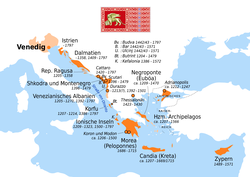Stato da Mar
| State of the Sea Stato da Màr (vec) |
|||||
| Domain of the Republic of Venice | |||||
|
|||||
| Map of the Venetian colonial empire | |||||
| Historical era | Middle Ages | ||||
| • |
Pietro II Orseolo treaty with Basil II |
992 the 10th century |
|||
| • | Fourth Crusade | 1202–04 | |||
| • | First Ottoman–Venetian War | 1463–79 | |||
| • | Cretan War | 1645–69 | |||
| • | Morean War | 1684–99 | |||
| • | Last Ottoman–Venetian War | 1714–18 1797 | |||
| • | Treaty of Campo Formio | 17 October 1797 | |||
The Stato da Màr or Domini da Mar ("State/Domains of the Sea") was the name given to the Republic of Venice's maritime and overseas possessions, including Istria, Dalmatia, Albania, Negroponte, the Morea (the "Kingdom of the Morea"), the Aegean islands of the Duchy of the Archipelago, and the islands of Crete (the "Kingdom of Candia") and Cyprus. It was one of the three subdivisions of the Republic of Venice's possessions, the other two being the Dogado, i.e. Venice proper, and the Domini di Terraferma in northern Italy.
The creation of the Venice's overseas empire began around 1000 AD with the conquest of Dalmatia and reached its greatest nominal extent at the conclusion of the Fourth Crusade in 1204, with declaration of the acquisition of three octaves of the Byzantine Empire. However, most of this territory was never controlled by Venice, being held by the Greek Byzantine successor states (the Despot of Epirus, the Empire of Nicaea, and the Empire of Trebizond) and much of the rest was soon lost as the Byzantine Empire of Nicaea reconquered Constantinople (1260).
However, for many centuries the "Stato da Màr" survived in the Balkans, mainly in the Adriatic sea that was even nicknamed "Mare di Venezia" (sea of Venice) on maps of the seventeenth and eighteenth centuries.
...
Wikipedia

